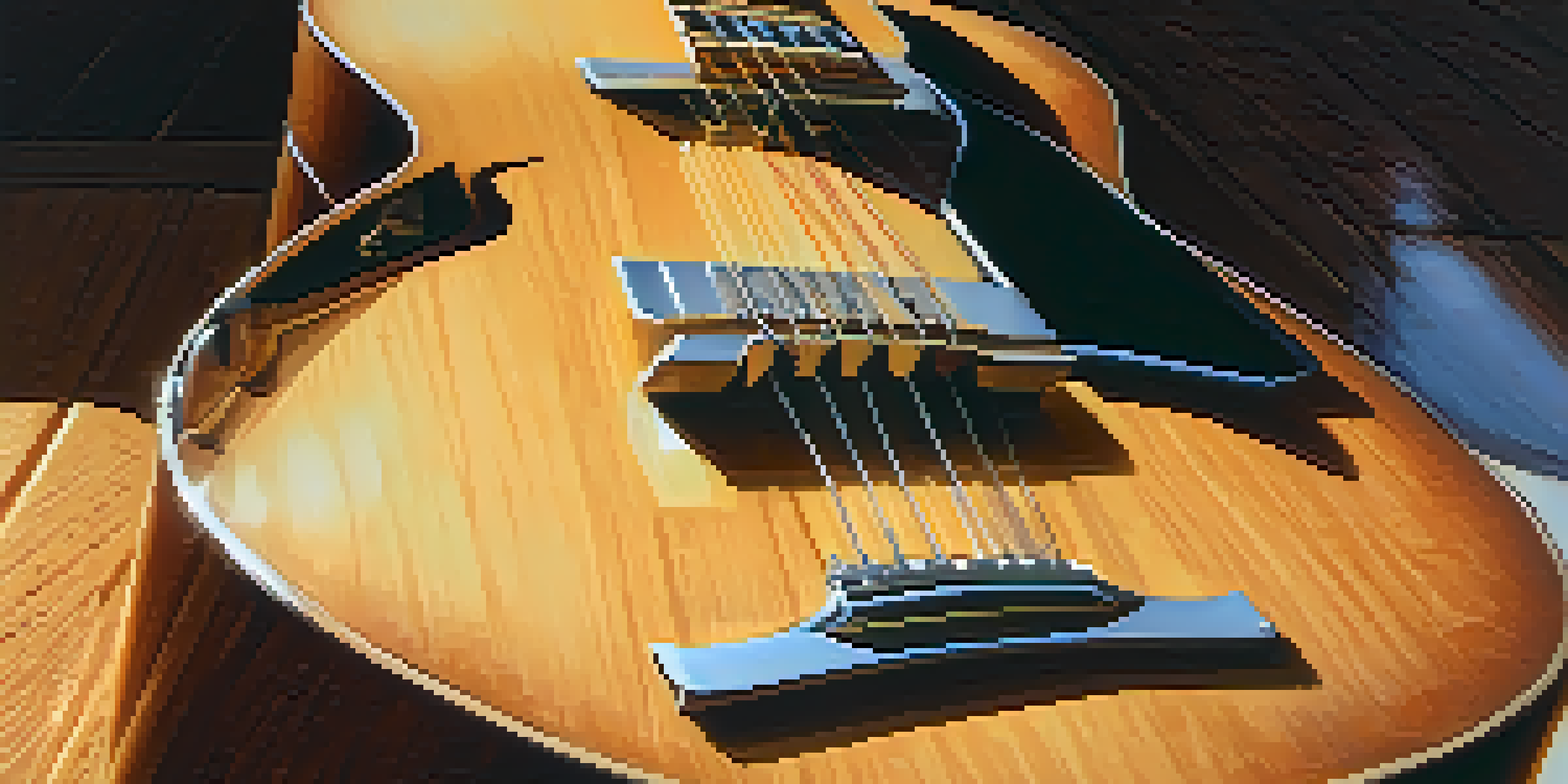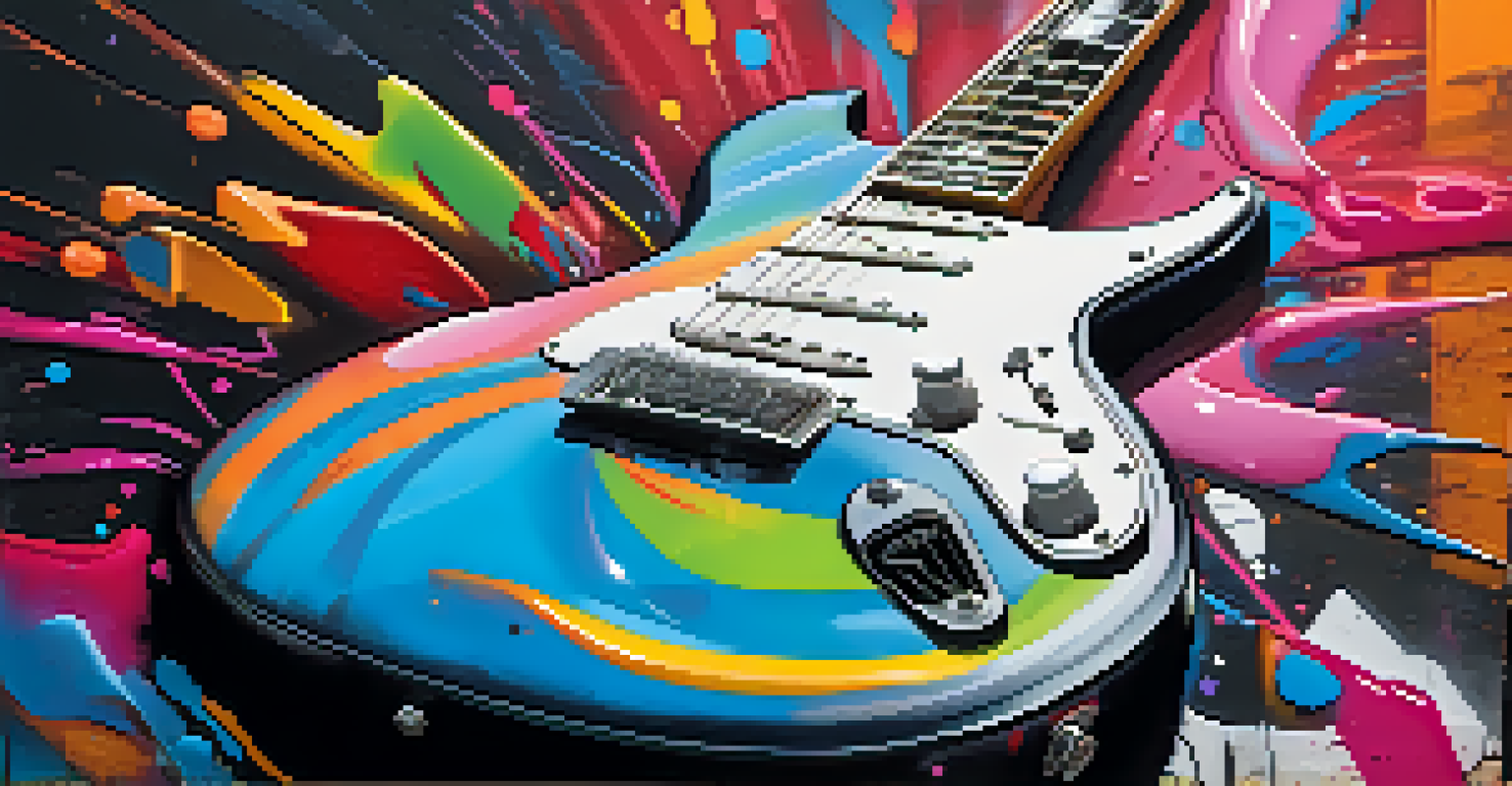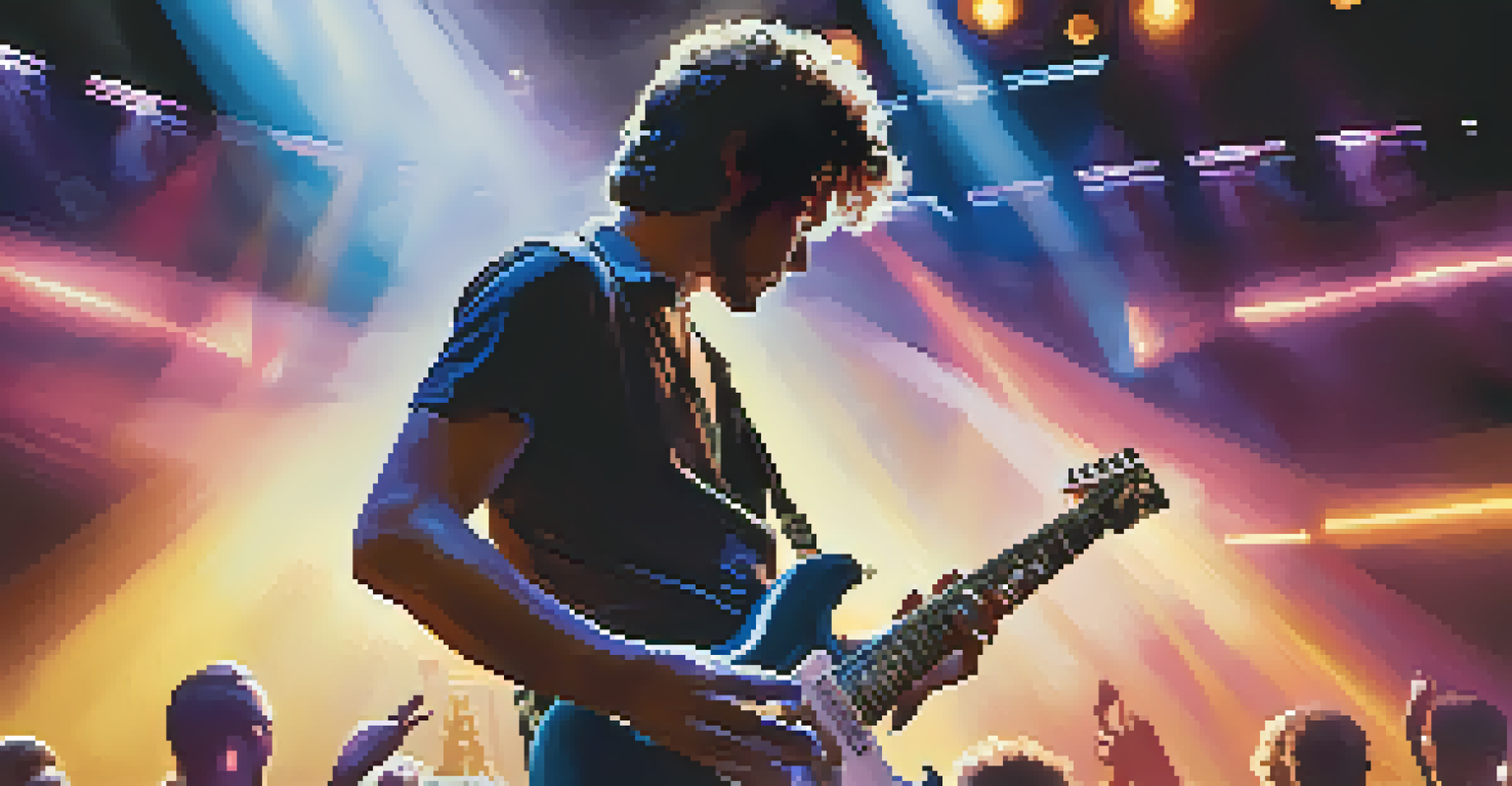Cultural Significance of Guitar in Contemporary Music

The Guitar: A Versatile Instrument in Modern Music
The guitar has evolved into one of the most versatile instruments in contemporary music. From rock and pop to jazz and blues, its ability to adapt across genres has made it a staple in the music industry. Whether it’s an acoustic strumming a heartfelt ballad or an electric guitar shredding a heavy solo, the guitar resonates with audiences on multiple levels.
The guitar is a miniature orchestra in itself.
This versatility allows musicians to express their creativity, making the guitar a pivotal tool for songwriters and performers alike. Despite the rise of digital music production, the tactile experience of playing a guitar remains irreplaceable. Its unique sound and playability invite both novice and seasoned musicians to explore their artistic sides.
Moreover, the guitar’s role in music transcends mere entertainment; it often becomes a form of personal expression. Many artists use it to share their stories and emotions, creating a deep connection with their audience. This emotional resonance is part of what makes the guitar so culturally significant today.
Historical Roots of the Guitar in Contemporary Music
The guitar's journey through history has shaped its place in contemporary music. Originating from various stringed instruments, it has been influenced by cultures worldwide, including Spanish flamenco and American blues. These rich traditions have created a diverse foundation for modern guitar playing.

As genres like rock and roll emerged in the mid-20th century, the guitar took center stage. Iconic artists such as Jimi Hendrix and Eric Clapton revolutionized guitar playing, inspiring countless musicians to pick up the instrument. Their unique styles not only pushed the boundaries of guitar music but also reflected the cultural shifts of their times.
Guitar's Versatility in Music
The guitar adapts across genres, making it a pivotal instrument for creativity and personal expression in contemporary music.
Today, the guitar continues to evolve, adapting to new musical influences and technologies. The blending of genres and the incorporation of digital effects keep the instrument relevant, showcasing its historical significance while paving the way for future innovations. This ongoing evolution highlights the guitar's enduring impact on contemporary music.
The Guitar as a Symbol of Cultural Identity
In many cultures, the guitar serves as a powerful symbol of identity and community. For instance, in Latin American music, the guitar embodies cultural heritage, playing a crucial role in genres like mariachi and tango. Here, the instrument becomes a vehicle for storytelling, connecting generations through shared experiences.
The electric guitar is a symbol of freedom and independence.
Moreover, the guitar has been instrumental in movements for social change. Artists have used it to voice their opinions and unite people during times of struggle. This has been evident in folk music, where songs often reflect the sentiments of a generation, making the guitar a significant cultural artifact.
As a result, the guitar transcends its role as just a musical instrument; it becomes a representation of collective identity and shared values. In this way, it fosters community bonds and inspires movements, making it not only culturally significant but also a catalyst for change.
The Role of the Guitar in Popular Music Trends
The guitar plays a vital role in shaping popular music trends, often leading the charge in genre evolution. From the surf rock of the 1960s to the grunge movement of the 1990s, guitar-driven sounds have consistently influenced mainstream music. These shifts often reflect broader societal changes, capturing the zeitgeist of their respective eras.
Contemporary artists continue to experiment with guitar sounds, pushing boundaries and blending genres. For instance, the fusion of hip-hop and rock, as seen in the works of artists like Lil Nas X, showcases the guitar's adaptability and appeal across different musical landscapes. This cross-pollination keeps the instrument relevant and engaging for diverse audiences.
Cultural Significance of Guitar
The guitar serves as a symbol of cultural identity and community, connecting generations and inspiring social movements.
As music streaming services make discovering new sounds easier than ever, the guitar remains crucial in attracting listeners. Its familiar tones can evoke nostalgia while simultaneously appealing to modern sensibilities. This balance ensures that the guitar remains a dynamic force in the ever-changing landscape of popular music.
Guitar Techniques That Define Contemporary Styles
Contemporary guitar music is characterized by various techniques that define different styles and genres. Techniques like fingerpicking, tapping, and slide guitar have become essential tools for modern musicians. Each method adds a unique flavor, allowing artists to develop their signature sounds.
One notable technique is the use of distortion and effects pedals in rock and metal genres. These tools enable guitarists to create powerful, resonant sounds that enhance their performances. By manipulating tone and texture, musicians can evoke specific emotions, further engaging their audience.
In addition, the rise of online tutorials and social media has democratized guitar playing, encouraging new players to explore these techniques. This accessibility fosters a vibrant community of guitarists who share their skills and innovations, ensuring that contemporary guitar styles continue to evolve and inspire.
The Electric Guitar's Impact on Modern Music
The electric guitar has had a profound impact on modern music, revolutionizing how music is created and experienced. Its introduction in the 1930s changed the landscape of popular music, allowing for greater volume and versatility. This shift enabled artists to explore new sonic possibilities, paving the way for genres like rock and funk.
With the electric guitar, musicians can experiment with a wide range of sounds, from clean tones to heavy distortion. This versatility has led to iconic riffs and solos that define entire songs. Think about the unforgettable opening riff of 'Smoke on the Water' or the soaring solos of legendary guitarists; these moments have become anthems for generations.
Electric Guitar Revolutionizes Sound
The electric guitar transformed music by enabling greater volume and experimentation, influencing various genres and fostering collaboration.
Moreover, the electric guitar fosters collaboration among musicians, often serving as a bridge between genres. Its adaptability allows artists to blend different styles, creating innovative sounds that appeal to diverse audiences. This collaborative spirit ensures that the electric guitar remains at the forefront of contemporary music.
The Guitar in Digital Music Production
As technology advances, the guitar's role in digital music production has transformed significantly. Musicians can now record and manipulate guitar sounds using various software and digital tools. This integration allows for a seamless blend of traditional guitar playing with electronic elements, expanding creative possibilities.
Digital audio workstations (DAWs) enable artists to layer guitar tracks, apply effects, and experiment with different sounds effortlessly. This accessibility has opened new avenues for collaboration and experimentation, encouraging even non-guitarists to incorporate guitar sounds into their projects. As a result, the guitar continues to influence modern music across various genres.

However, this shift also raises questions about the authenticity of music in a digital age. While technology offers incredible tools, some argue that it can dilute the raw emotion that comes from live playing. Nonetheless, the guitar remains a crucial element in bridging the gap between traditional musicianship and modern production techniques, ensuring its lasting cultural significance.